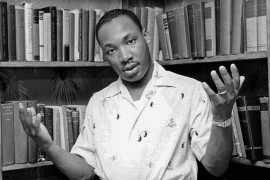Writing in N’DIGO last month, that ‘Maverick Media Maven‘, Hermene Hartman, reported on a Black female journalist who complained that a white editor of a major newspaper cut her proposed column so much it was unrecognizable.
That’s so Hermene. N’DIGO’s editor and publisher rarely misses a chance to promote Black issues and excellence, especially when any powers-that-be attempt to render us invisible. That’s why this ‘Maverick Media Maven‘ (hereafter referred to as M3) started the print edition of N’DIGO in 1989 and for a time had it inserted with a major metro newspaper. But as print media fell behind various digital platforms, M3 established this web version and by so doing expanded the reach of Black thought. Alert to the trends and interests of Generation Z, she recently added N’DIGO STUDIO, a podcast-type interview show that streams anytime at https://ndigo.com/ndigo-studio-podcasts/ and airs weekly on NBC Ch.5. Hartman has managed to pair HipHop with Jazz, young with not-so-young, making for transgenerational attention and appeal.
No, this is not a paean to Hermene nor a self-serving shout-out to my journalistic pal, but an honest response to a well-known fact that needs constant repeating. For decades – no, centuries — Black Voices in America have been stilled, hushed and tamed. Examples abound, but let us consider one with which all are familiar – the ubiquitous Hollywood-produced Western movie.
Black Gunslingers Show Up!
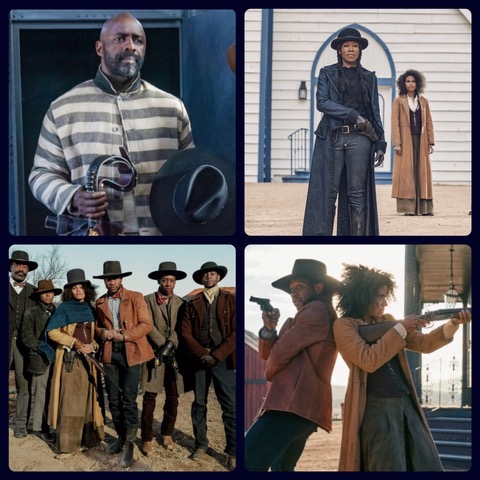
No genre more obscures the existence of Blacks. So indoctrinated were we with Gene Autry, Roy Rogers, and John Wayne that we never knew that, according to the Smithsonian, one in every four cowboys was Black. Back in the day, however, young Blacks were encouraged to root for all-White cowboys and pony soldiers as they routed, killed and otherwise displaced the “Indians” – our widely-accepted misnomer for Native Americans.
Before 2020 you hardly ever saw a Black cowboy. Only now, like the legendary Jim Dandy come-to-the-rescue, Jeymes Samuel has co-written and directed a remedy to this Black exclusion titled ‘The Harder They Fall.” By assembling an all-star cast of Black actors including Idris Elba and Regina King, Samuel has revised forever our collective memory of the Old West. Recently the Divine Nine (our coalition of 9 progressive Black Fraternities and Sororities) hosted a special screening to which this Alpha and his AKA wife attended. It’s the first feature film from writer, director, producer and composer Samuel, a British brother better known for releasing his music and accompanying shorts under his pseudonym The Bullitts.
Actor Idris Elba recently hailed the film to Indiewire.com as nothing short of revolutionary for its portrayal of Black people in a region and time that Hollywood had thoroughly white-washed. “What we should be celebrating and what we have been celebrating here today is the impact of the movie on film and on story telling. My daughter is at NYU, she’s 19 years old, she comes to see the film and she immediately went back and it changed her life, because she saw historical figures that she had no consciousness of, in a genre she had no attachment to.” He concluded “The ripple effect is going to help cinema (as) film makers diversify their lens a bit in how you tell stories of Black folk.” According to Justin Chang, NYT.
The storyline revolves around Nat Love, a fact-based fictionalized gunslinger and Black cowboy legend born to enslaved parents on a Tennessee plantation in 1854. As a young boy he loses his family in spectacularly brutal fashion, setting up a long-simmering revenge plot. Years later he and his trusted gang find themselves tracking his parents’ assassins led by the vicious outlaw Rufus Buck (Elba). Regina King is Treacherous Trudy Smith and Zazie Beetz is Stagecoach Mary, who in real life was the first Black woman to work for the U.S. Postal Service. Shawn Carter, AKA Jay Z, works his magic with the film’s musical score bringing Hip Hop and Afro-Caribbean to a western film. Not only does “Harder” reinstate Black people to the American Western, but two strong Black women are shown fighting it out — something seldom if ever seen in old Westerns.
August’s Answer…
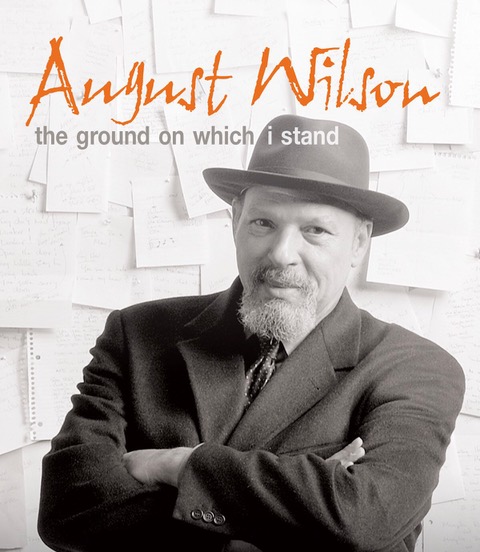
In truth, Samuel’s new movie builds on themes already brought to the live stage by playwright August Wilson, who adroitly anticipated the widening demand for greater visibility, inclusion and perspective of African Americans in the performing arts.
Before his death in 2005 Wilson had written 10 plays covering the African American journey, decade by decade, during the 20th Century. The winner of 2 Pulitzer Prizes for Drama, Wilson once visited Chicago’s Goodman Theatre at the invitation of Resident Director Chuck Smith. My wife and I joined them for dinner prior to the performance of one of his plays, whereupon Wilson kept us in rapt silence, especially after I questioned him about the mission of the Black playwright.
Nothing can come close to what he said that evening, except perhaps for what he wrote in his 46-page jewel of an essay/book The Ground On Which I Stand. Therein he outlines exactly how he felt and what his work intends. I didn’t record him that night, but he repeated several key points from his book:
* There are and always have been two distinct and parallel traditions in Black art. That is art that is conceived and designed to entertain white society and art that feels the spirit and celebrates the life of Black Americans by designing its strategies for survival and prosperity.
* We can meet on common ground of theatre as a field of work and endeavor, but we cannot meet on the common ground of experience. Where is the Common ground in the horrifics of lynching? Where is the common ground in the maim of the policeman’s bullet? Where is the common ground in the hull of the slave ship or the deck of a slave ship with it’s refreshments of air and expanse.
* Nor do we need the recognition of our Blackness to be couched in abstract phrases like “artist of color.” Who are you talking about? A Japanese artist? An Eskimo “A Filipino? A Mexican? A Cambodian? A Nigerian? Are we to suppose that one white person balances out the rest of humanity lumped together as a non-descript “people of color? We reject that. We are unique and we are specific.
* We stand on the verge of an explosion of playwriting talent (Wilson said this in 1996, how prescient!) That will challenge our critics. As American playwrights absorb the influence of television and use new avenues of approach to practice their craft they will grow to be wildly inventive and imaginative in creating dramas that will guide and influence contemporary life for years to come.
Wilson’s Legacy Lives…

Television and ‘the new avenues” of media notwithstanding, Black America would do well to keep alive the benediction of August Wilson. Indeed that is the aim of the Goodman’s Chuck Smith and Dr. Sandra Shannon, president and founder of the August Wilson Society (AWS.) Chuck is a childhood friend and Resident Director at the Goodman Theatre. Shannon is Professor Emerita of African American literature in the Department of English of Howard University, where she is Founder and President of the August Wilson Society.
There is no question that the work of Wilson should be studied, taught and continually reinterpreted. AWS defines itself as a cross-disciplinary learning community dedicated to commemorating the playwright by promoting the studying, the teaching, the performing, the researching and the ultimate safeguarding of his rich legacy. And what a legacy it is, rendering into poetry and drama the history, decade-by-decade, of African Americans in the 20th Century. Wilson made America and the world more aware of the saga of a people struggling to gain equitable status in a culture they helped build. Through the immensity and ambition of his vision, Wilson crafted a series of linked narratives that not only captured many of the untold stories of the Black experience, but increased the presence of African American performers and theatrical talent throughout this nation and beyond. Wilson opened the doors of mainstream theaters to the voices and perspectives of African-descended people, most of them “involuntary immigrants” to this country.
Conclusion…
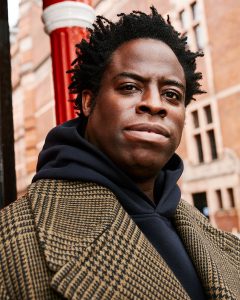
Summing up, we need to face the challenge of Black invisibility. Our invisibility is largely intentional as outlined and reported by Hermene Hartman. But we must respond with innovations such as those employed by Black film director/writer Jeymes Samuel, who uses Black Actors to create a blockbuster film about a time largely unknown.
Action Items…
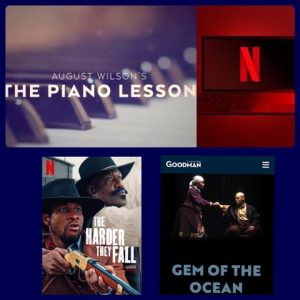
Best of all, we have the legacy of a thought leader, August Wilson, who provided a map now kept and communicated by the August Wilson Society. I’m no theatre or film critic, but as an advocate for Black Business and a survivor of Civil Rights struggles both won and lost, I beg our larger Black community to support this emergence from invisibility. Here are some good places to start:
* Watch August Wilson’s “The Piano Lesson” on Netflix.
* Go see Wilson’s “Gem of the Ocean” at the Goodman Theatre in January.
* Support the August Wilson Society and along with Business Leadership Council’s Charles Smith and myself the AWS pilot program to introduce Black youth to the performing arts. https://www.augustwilsonsociety.org/
* Black Business Scholarships are also being established in honor of Director Chuck Smith for Goodman Theatre Interns.
* See the film “The Harder They Fall“. Yes, Virginia, there were indeed Black Buckaroos.
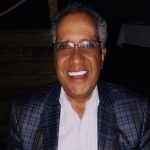 Paul King is a construction consultant and member of Chicago’s Business Leadership Council.
Paul King is a construction consultant and member of Chicago’s Business Leadership Council.





